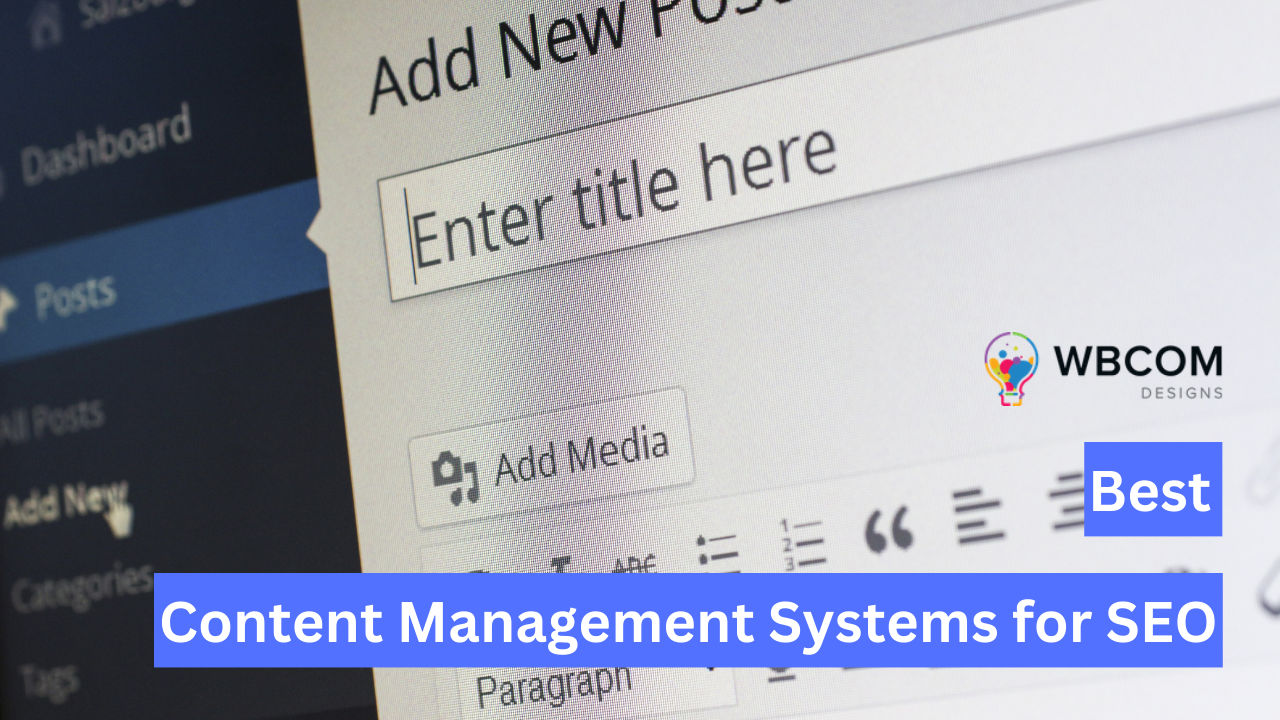Do you want your website to be seen by millions of people online? Then, you need to master SEO, and the first step is to choose the best content management system (CMS) for your website. The CMS you use can make or break your SEO strategy, and choosing the wrong one could cost you precious time, money, and effort. With so many options available, it can be overwhelming to pick the right one. But don’t worry; we’ve got you covered. In this blog post, we’ll explore the best content management systems for SEO and tell you why they are the best. So, if you’re ready to take your website’s SEO to the next level, keep reading.
Table of Contents
ToggleWhat is a CMS?
CMS, or Content Management System, is a software application allowing users to create, manage, and publish digital content online. It provides an interface that simplifies the process of creating and organizing content, enabling website owners to update and manage their website’s content easily without requiring technical knowledge or coding skills.
CMSs allow users to create different types of content, such as articles, blog posts, pages, images, videos, and other multimedia elements. They also offer a variety of tools to help manage content, including content creation and editing, content scheduling, version control, and user management.
Some famous examples of CMS platforms include WordPress, Joomla, Drupal, Shopify, and Wix. Each CMS has its features, advantages, and disadvantages, making it essential to choose the suitable CMS that suits your needs and requirements.
Factors to consider when choosing the best Content Management System for SEO
Here is an in-depth description of factors to consider when choosing the best Content Management System for SEO!
SEO-friendly features
When selecting the best Content Management System for SEO, you must ensure it has built-in SEO-friendly features. Here are some essential features to look for:
- URL structure and customization – The best content management systems should allow for the customization of the URL structure, making it easy to optimize for keywords and search engines.
- Metadata customization – The CMS should allow for the customization of meta titles, descriptions, and tags to help improve click-through rates and search engine rankings.
- Image optimization – The CMS should have built-in tools to optimize images for size and resolution, allowing faster load times and a better user experience.
- Page speed – The CMS should be optimized for fast loading times, crucial for user experience and search engine rankings.
- Mobile responsiveness – The CMS should have a responsive design to ensure your website looks great and functions well on all devices, including smartphones and tablets.
- SSL certificate – The CMS should support SSL certificates to ensure your website is secure, essential for user trust and search engine rankings.
- XML sitemap generation – The CMS should generate XML sitemaps automatically to help search engines crawl and index your website’s pages.
Best Content Management Systems for SEO
1. WordPress
Overview – WordPress is one of the best content management systems in the world, powering over 40% of all websites on the internet. It’s a free and open-source platform that is easy to use, making it a popular choice for bloggers, small businesses, and large enterprises.
SEO features – WordPress is known for its SEO-friendly features, including customizable URL structures, meta tags, and XML sitemaps. Additionally, many SEO plugins, such as Yoast SEO and All in One SEO Pack, can help optimize your website for search engines.
Pros and cons –
Pros: WordPress is easy to use, has a large community of developers and users, and offers many SEO plugins.
Cons: As one of the best content management systems, WordPress is often targeted by hackers, which can lead to security issues. Additionally, some customization options may require technical expertise.
2. Joomla
Overview – Joomla is a popular open-source CMS platform known for its flexibility and ease of use. It’s a popular choice for medium to large-sized businesses, offering many customization options.
SEO features – Joomla offers many SEO features, including customizable meta tags, URL structures, and XML sitemaps. Additionally, there are many SEO extensions available that can help optimize your website for search engines.
Pros and cons –
Pros: Joomla is flexible and offers many customization options. It also has a large community of developers and users.
Cons: Joomla may require more technical expertise than other CMS platforms, and some extensions may not be as reliable as others.
3. Drupal
Overview – Drupal is a powerful open-source CMS platform known for its scalability and security. It’s a popular choice for large enterprises and government organizations.
SEO features – Drupal offers many SEO features, including customizable URL structures, meta tags, and XML sitemaps. Additionally, many SEO modules are available that can help optimize your website for search engines.
Pros and cons –
Pros: Drupal is highly scalable and secure, making it a popular choice for large enterprises and government organizations. It also offers many customization options.
Cons: Drupal may require more technical expertise than other CMS platforms and may not be as user-friendly as other platforms.
4. Shopify
Overview – Shopify is one of the best content management systems for e-commerce websites. It offers many customization options and is known for its ease of use.
SEO features – Shopify offers many SEO features, including customizable meta tags, URL structures, and XML sitemaps. Additionally, there are many SEO apps available that can help optimize your e-commerce website for search engines.
Pros and cons –
Pros: Shopify is easy to use and offers many customization options for e-commerce websites. It also has many SEO apps available.
Cons: Shopify may not be the best choice for non-e-commerce websites and can be more expensive than other CMS platforms.
5. Wix
Overview – Wix is a famous website builder offering a drag-and-drop interface, making it easy for those without technical expertise.
SEO features – Wix offers many SEO features, including customizable meta tags, URL structures, and XML sitemaps. Additionally, there are many SEO apps available that can help optimize your website for search engines.
Pros and cons –
Pros: Wix is easy to use and offers many customization options for those without technical expertise. It also has many SEO apps available.
Cons: Wix may not be the best choice for large or complex websites and may not offer as much flexibility as other CMS platforms.
Wrapping Up Words | Best Content Management Systems
In conclusion, choosing the right content management system for SEO is crucial for success. With so many options available, it can be overwhelming to make a decision. However, by considering the factors we’ve discussed and doing your research, you can find a CMS that meets your needs and helps you climb the search engine rankings.
Remember, SEO is an ongoing process, and your CMS plays a vital role in making it easier for search engines to crawl and index your content. So, invest in the best content management systems prioritizing SEO and watch your website soar to new heights!
Interesting Reads:
How Do Paypal, Shopify, and WooCommerce Compare?





